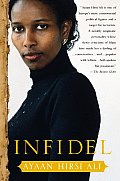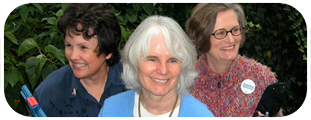
Ayaan Hirsi Ali is a remarkable woman. She first came to the attention of most
people when it was clear that a political killing in the Netherlands in 2004
was a direct attack on her as an outspoken female emigrant Muslim who had recently been
elected to Parliament. The
filmmaker Theo van Gogh was violently killed on the street, almost unheard of
in that country, by a Moroccan man who left a note addressed to Hirsi Ali on
van Gogh's chest, pinned there by one of the knives used to kill him. He and Hirsi Ali had just made a film
together about the horrors that Islamic women face simply by being women in a
culture that often treats women like chattel still.
Hirsi Ali had observed and been at the butt end of the miseries
common to the majority of east African women from her childhood to the time when she
fled an unwanted marriage and took refuge in Amsterdam. The book "Infidel" is a book about her
remarkable life, the slow and tortuous reevaluation of her religion, her fierce
fighting for refugee women's rights and her openness to a foreign history and
culture that continually amazed her.
From Somalia to the Netherlands
She had been born in Somalia to a well-known father who was
an early rebel leader living outside the country most of the time and a mother
increasingly embittered at having to raise her three children by herself with
no education or skills. The family
lived in Saudi Arabia, Kenya and Ethiopia as well, giving the young Ayaan a
view of Islamic societies from several angles as she and her brother and sister
struggled to adapt to each new school.
It is an astounding and troublesome look in to a society we rarely get
to observe first-hand.
At age 24, Hirsi Ali arrived in the Netherlands as a refugee
from Germany where she was supposed to be waiting to go to Canada to join her
new husband. He was a very
conventional, proper Muslim man whom her father had arranged for her to marry
after knowing him for only two hours.
He was of the proper lineage though and had a good job in Canada. Why not? After spending a limited amount of time with him in Kenya
before he left for Canada, Hirsi Ali knew she did not want to spend her life
trapped like almost all the women she knew.
When she arrived in Germany, she sought information about
Europe from family members there and then took a train to Amsterdam alone with
only a small satchel of clothes and papers to "visit" another family
member. She sought and gained
refugee status and slowly made use of the generous welfare and education
benefits to go back to school, ultimately going for a PhD to study political science. She was most interested in understanding why Europe had done so well while much of the rest of world was struggling.
More after the fold.
A Changing Worldview
Hirsi Ali worked part-time as a Somali/Dutch translator and so heard first-hand the horrendous stories of Islamic women who were
still living in the traditional ways.
She began to talk about what she saw as the terrible mistake the Dutch
were making allowing Muslims to live in their old ways, providing money for
separate schools and community centers and not insisting that Islamic women
have the same rights as Dutch women.
The attacks of 9/11 forced Hirsi Ali to look yet again at
the Quran and the very basis of Islam.
She struggled with her own beliefs. She began to talk and later write about the words in the
Quran and how, in her reading, they led inextricably to the attacks on the
World Trade Center as well as to the degradation of women. Her
writing and her views brought her attention - and threats on her life. From that time, in late 2002, to the
time she moved to the US in 2006, she was under constant threat.
That threat increased when she ran on the Liberal Party
slate for Parliament and won. The
Liberal Party in the Netherlands is considered right-wing although in the US
it would be somewhere in the range of where the Democratic Party is. Although Hirsi Ali had been working as
a researcher for the Labor Party, the Party leaders did not align with her
views on Islam. The Liberal Party
did.
Joining the American Enterprise Institute
It seems clear that Hirsi Ali would not willingly have moved
her base to the US but 1) the threats on her life were unending and 2) her
public answers about lying to get refugee status in 1992 led to the revoking of
her citizenship.
Now comes what I see as the unnerving part. When life became so hard and dangerous,
the American Enterprise Institute created a landing spot for Hirsi Ali in
Washington D.C. in their conservative think tank. She accepted their offer and has since worked for the AEI
but lived in the Netherlands in a secret location, still under the protection
of the Dutch government.
I am unnerved by her association with the AEI for a couple of reasons. First, I agree with Hirsi Ali's arguments about the need to stand firm about women's rights in the West, respectful but firm. I just don't think people can move to Western countries and maintain medieval practices like female genital mutilation and forbidding women to leave the house without permission in the Netherlands or Great Britain or the US. For me it is one of the strange bedfellows situations I occasionally find myself in. Honoring a different culture is one thing; honoring damaging conventions is another. Secondly, I think that she is a brilliant and bold thinker and a real catch for the AEI. The political animal in me finds it unnerving that they have such a great person in their stable.

Fascinating, Lynn, thank you for bringing this book and this woman to our attention.
I am particularly taken by the paradoxes - her working, for example, for the American Enterprise Institute of all places. But I would imagine that her life is quite complex.
Hi Lynn! Good to be back here :)
Stories like this make me realize how few obstacles I've had to overcome in my life...I think of the adage "To whom much has been given, much will be required." What can I do with my freedom? How can I use my voice?
Sally, I forgot to mention that it is also a great read. I read mostly non-fiction so that I won't stay up until 3:00 in the morning reading. But I did just that with this book, it was so compelling and so well written.
Sarah, I had the same thought. If you get a chance to read it or read and discuss it with your book group, it is astounding how she got from where she started to where she is now. That was a lot to overcome. And, you are a light in the world already and an inspiration to many. I look forward to seeing where else that might take you in the future.
People like Ayaan Ali are always much more interesting and influential amongst non-Muslims than amongst Muslims.
By taking the type of decisions Ms Ali has, she has forfeited any impact amongst Muslims she may have had. In the intellectual circles in the Muslim world, no ones cares for her, or is interested in what she has to say. Let the AEI rejoice in having her. It is rather fitting.
The Iranian civil rights activist (and Nobel prize winner) Shirin Ebadi is a better example than Ms Ali in terms of influence. Her style - of blending advocacy for gender equality, a nationalist love of Iran, together with scrutiny of Western ideas - is authentic. She is diplomatic; she understands the various factors at play.
But Ms Ali chose simply to go with her gut. "I've had a rough ride, therefore my religion and its people are responsible." That's a bit like the fundamentalists; they also simplify and go with their gut (in a different direction to Ms Ali). Obviously everybody justifies and creates an "evidence-based narrative" to support their case.
A quick follow-up:
In so far as Ayaan Ali has shed light on what goes on amongst some of the old-school, very traditional communities in European countries, she has done good. Those countries, stuck as they are in their self-delusion of superiority, were letting those communities do as they please. Good for Ayaan Ali for making those governments butt in and say "hang on a sec, this isn't right."
That's about as much credit as I will give her.
Plus, I will give her some extra marks for dissent. Creativity is nothing without dissent.
Ahmed, thanks for your perspective. I should have run this by you before I put this up. However, it does strike me that the situation for women in Islamic countries might depend on class and education and history. A country like Egypt, which has been more secular and has a history of education, would treat women better than countries whereas Saudi Arabia or Somalia where woman's rights are not embedded in the culture.
Lynn, Ayaan Ali went much further than her own limited observations about her society: she generalised the observations to the religion and twinned it with violence and terrorism. One heckuva of a leap!
The issue of "status of women" is not an organic, local one in many parts of the world. The Western concern for gender equality in other people's societies - for me - is similar to when a partisan person asks someone from a different party a loaded question. It is a reflection of a different ordering of priorities. Many would say the loaded-question approach is underhanded.
Sure, many women in Saudia Arabia and elsewhere feel deeply wronged. But I doubt that the majority feel that way; it is not clear that they yearn for radical change. Yes, anything that boosts their status and improves their societal bargaining power they would welcome - who wouldn't! But the most important priorities for women in Somalia, say, may surprise you. These probably are: political unity, better employment opportunities, etc.